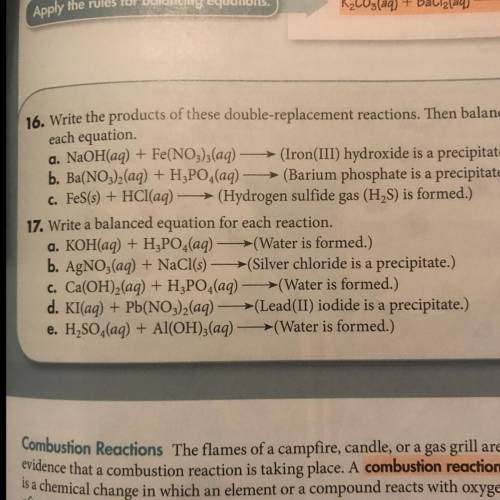17. Write a balanced equation for each reaction.
a. KOH(aq) + H3PO4(aq) ->(Water is formed....

Chemistry, 03.03.2020 05:04, smcardenas02
17. Write a balanced equation for each reaction.
a. KOH(aq) + H3PO4(aq) ->(Water is formed.)
b. AgNO3(aq) + NaCl(s) ->(Silver chloride is a precipitate.)
C. Ca(OH)2(aq) + H3PO4(aq)- (Water is formed.)
d. Kl(aq) + Pb(NO3)2(aq) ->(Lead(II) iodide is a precipitate.)
e. H2SO (aq) + Al(OH)3(aq) ->(Water is formed.)


Answers: 2
Other questions on the subject: Chemistry

Chemistry, 22.06.2019 02:00, lwattsstudent
In the following redox reaction which is the oxidizing agent and which is the reducing agent? alcl3 + na nacl + al
Answers: 1


Chemistry, 22.06.2019 10:20, blondielocks2002
Gwhich r group would most likely be found in a hydrophobic area of the tertiary structure of a globular protein? which r group would most likely be found in a hydrophobic area of the tertiary structure of a globular protein? −ch2−oh −ch2−o||c−nh2 −ch2−coo− −ch2−ch2−ch2−ch2−n+h3
Answers: 3
Do you know the correct answer?
Questions in other subjects:




Mathematics, 29.09.2019 01:20



Mathematics, 29.09.2019 01:20



Chemistry, 29.09.2019 01:20






